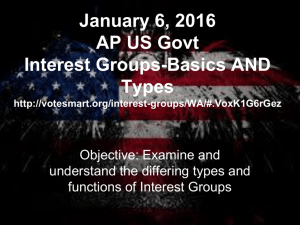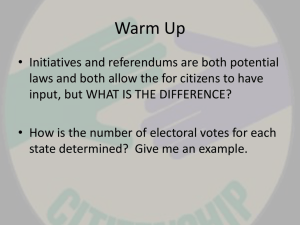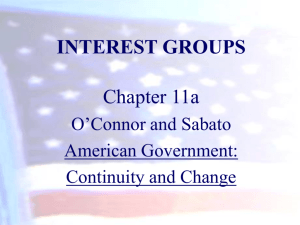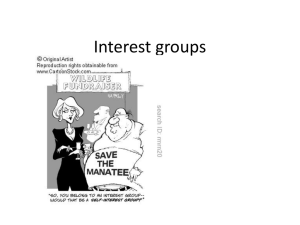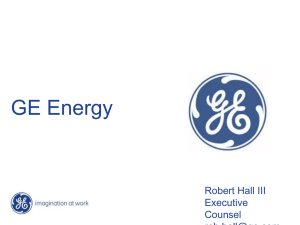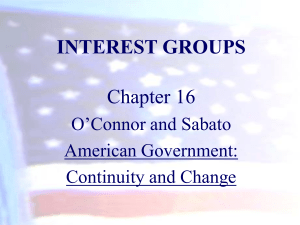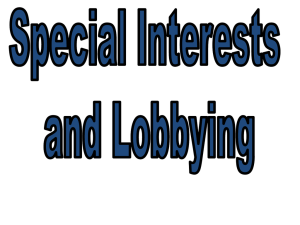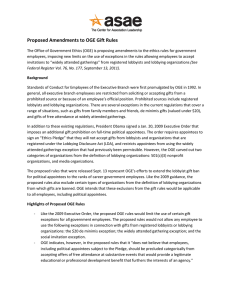Proposed New Federal Rules Further Restrict Activities of Registered Lobbyists
advertisement
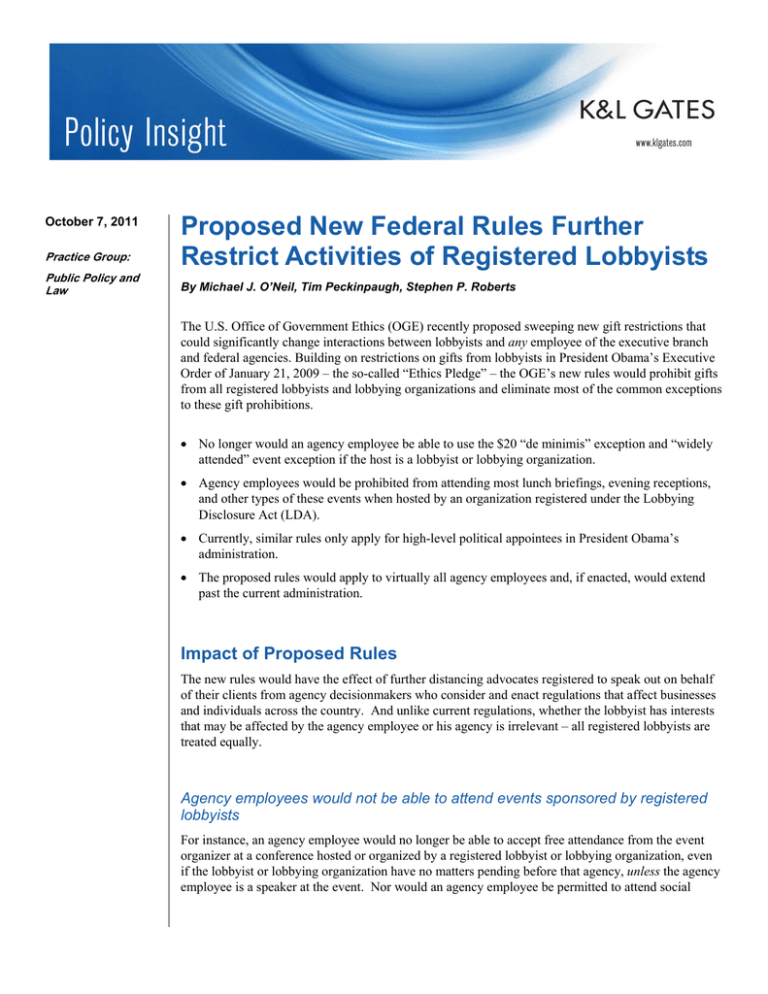
October 7, 2011 Practice Group: Public Policy and Law Proposed New Federal Rules Further Restrict Activities of Registered Lobbyists By Michael J. O’Neil, Tim Peckinpaugh, Stephen P. Roberts The U.S. Office of Government Ethics (OGE) recently proposed sweeping new gift restrictions that could significantly change interactions between lobbyists and any employee of the executive branch and federal agencies. Building on restrictions on gifts from lobbyists in President Obama’s Executive Order of January 21, 2009 – the so-called “Ethics Pledge” – the OGE’s new rules would prohibit gifts from all registered lobbyists and lobbying organizations and eliminate most of the common exceptions to these gift prohibitions. No longer would an agency employee be able to use the $20 “de minimis” exception and “widely attended” event exception if the host is a lobbyist or lobbying organization. Agency employees would be prohibited from attending most lunch briefings, evening receptions, and other types of these events when hosted by an organization registered under the Lobbying Disclosure Act (LDA). Currently, similar rules only apply for high-level political appointees in President Obama’s administration. The proposed rules would apply to virtually all agency employees and, if enacted, would extend past the current administration. Impact of Proposed Rules The new rules would have the effect of further distancing advocates registered to speak out on behalf of their clients from agency decisionmakers who consider and enact regulations that affect businesses and individuals across the country. And unlike current regulations, whether the lobbyist has interests that may be affected by the agency employee or his agency is irrelevant – all registered lobbyists are treated equally. Agency employees would not be able to attend events sponsored by registered lobbyists For instance, an agency employee would no longer be able to accept free attendance from the event organizer at a conference hosted or organized by a registered lobbyist or lobbying organization, even if the lobbyist or lobbying organization have no matters pending before that agency, unless the agency employee is a speaker at the event. Nor would an agency employee be permitted to attend social Proposed New Federal Rules Further Restrict Activities of Registered Lobbyists events sponsored by any registered lobbyist. In the Federal Register Notice of Proposed Rulemaking,1 the OGE claims that this prohibition is necessary because “social events of this type sometimes are used as lobbying tools,” and while the lobbyist may not have pending matters before the employee’s agency, “[t]he potential for harm, while perhaps latent, is nonetheless real.” As discussed above, the proposed regulations would prohibit federal agency employees from attending events sponsored by lobbyists or lobbying organizations, by eliminating the “widely attended” event exception to the gift rule. Similar to the “Ethics Pledge,” this means that if a lobbyist or lobbying organization wishes to host an event that includes agency employees, any food and beverage provided must be minimal (such as soda, coffee or donuts), or the agency employee must simply pay for any food and beverage he or she consumes at an event. Registered lobbyists not currently targeted by agency-wide gift rules Under the existing rules set up in 1992, “registered lobbyists” were not prohibited, as a group, from 2 providing a gift to an executive branch employee. Instead, current gift prohibitions focus on those gifts from a “prohibited source” or those given because of the employee’s official position. A prohibited source is considered to be an entity who (1) is seeking official action by the employee’s agency; (2) does business or seeks to do business with the employee's agency; (3) conducts activities regulated by the employee's agency; (4) has interests that may be substantially affected by performance or nonperformance of the employee's official duties; OR (5) is an organization, such as a trade association, a majority of whose members are described in (1) through (4) above. Proposed rules would not consider whether a lobbyist has interests before the agency However, under the proposed rules, any registered lobbyist would now be absolutely prohibited from providing anything of value to a federal agency employee, unless one of a few narrow exceptions applies, regardless of the lobbyist’s policy interests or interactions with the employee’s agency.3 Should these new rules be promulgated, “unregistered lobbyists,” or those advocating but falling under the relevant registration thresholds, would be subject to fewer restrictions than those registering and complying with existing federal law. 1 Standards of Ethical Conduct for Employees of the Executive Branch; Proposed Amendments Limiting Gifts From Registered Lobbyists and Lobbying Organizations, 76 Fed. Reg. 56,330 (Sept. 13, 2011). 2 3 The current lobbying registration statute, the Lobbyist Disclosure Act, was not enacted until 1995. The existing less-restrictive prohibitions on “prohibited source” gifts would also remain in place. 2 Proposed New Federal Rules Further Restrict Activities of Registered Lobbyists Exceptions to the Proposed Rules for certain registered lobbyists While the OGE’s proposed regulations are highly restrictive, they do not apply equally to all lobbying organizations and lobbyists. As with the Ethics Pledge, the OGE identified similar types of organizations that would be exempted from the proposed gift prohibitions: a 501(c)(3) tax-exempt organization (including a registered lobbyist who is an employee of that organization); an institution of higher education; a media organization “in connection with the organization’s information gathering or dissemination activities” (noting that OGE “does intend that the exclusion would permit employees to accept invitations from media organizations to attend the typical ‘press dinners’ at which journalists and government officials interact with each other, as such interactions foster relationships that further the news gathering functions of the organizations”); and A nonprofit professional association, scientific organization or learned society, with respect to any gift made in connection with the entity’s educational or professional development activities. These exceptions may prove to be particularly important in the context of a “widely attended” gathering such as an educational conference or other event. Like the Ethics Pledge, the prohibition would not apply to these exempted organizations that employ an outside lobbyist but are not themselves registered under the LDA. Even with these exceptions, since the existing “prohibited source” gift limitations would remain in place, the OGE reminds federal agency employees that just because an entity is excluded from gift prohibitions from registered lobbyists, it “does not necessarily mean that a gift from such an organization may be accepted.”4 Conclusion The OGE is accepting written responses to the proposed regulations until November 14, 2011. According to the OGE, one of the major goals of these proposed regulations is to make all federal ethics regulations, both from the legislative and executive branch, have a “consistent message.” However, these proposed rules are more restrictive in significant ways than those issued by the House and Senate Ethics Committees. For more information on these proposed regulations or to file written comments on these proposed regulations, consult with one of K&L Gates’ political ethics lawyers. 4 76 Fed. Reg. 56,330, 56,336. 3 Proposed New Federal Rules Further Restrict Activities of Registered Lobbyists Authors: Michael J. O'Neil Tim Peckinpaugh Stephen P. Roberts mike.oneil@klgates.com +1.202.661.6226 tim.peckinpaugh@klgates.com +1.202.661.6265 steve.roberts@klgates.com +1.202.778.9357 4

